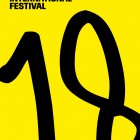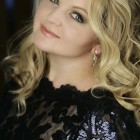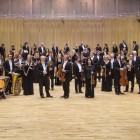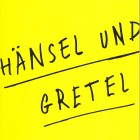Hansel and Gretel 2018Edinburgh International Festival
Read more about the opera Hansel and Gretel
The operatic offering at the 2018 Edinburgh International Festival consisted of three fully staged productions imported from leading French companies. There were also two concert performances.
In recent years we have heard several of Rossini's less frequently performed operas. Now we could see, together for the first time here, his two most popular comic masterpieces. The Barber of Seville was presented by Le Théâtre des Champs-Elysées, on their first visit from Paris and Cenerentola by the familiar and welcome Opéra de Lyon.
In addition, John Gay's Beggar's Opera was performed by the Théâtre des Bouffes du Nord, from Paris, who had a substantial residency at the Festival. William Christie led the musical side of this multinational coproduction.
The third instalment of Wagner's Ring, Siegfried , was performed in the Usher Hall. Sir Mark Elder conducted the Hallé; the all-star cast included Simon O'Neill (Siegfried), Christine Goerke (Brünnhilde) and Iain Paterson (Wanderer).
The creepy forest theme continued with a concert performance of Humperdinck's Hansel and Gretel, given by the RSNO under Sir Andrew Davis. Elizabeth DeShong (Hänsel) and Laura Wilde (Gretel) led the cast.
Two important oratorios were also given in the Usher Hall. The Dunedin Consort performed Handel's mighty Samson and the Festival's opening concert was Haydn's Creation.
It seems that conductors of Humperdinck's masterpiece divide into two camps - those who emphasise the Wagnerian associations and those who attempt to minimize them. Perhaps the latter group consist of musicians who have been deprived of Wagnerian experience. In any event, Sir Andrew Davis has had plenty of opportunities to conduct the works in recent years, and showed himself to be an excellent Wagnerian with his 2017 performance of Die Walküre at the Festival. He now turned his attention to what sometimes seems like the most Wagnerian opera not actually by the master, and with Siegfried still ringing in our ears from the week before, the echoes came over loud and clear.
Humperdinck was Wagner's assistant during the final preparations of Parsifal, and inevitably picked up a few ideas from that great work as well as the Ring. It still seemed a bit odd to be doing Hänsel in concert form, but the result, as with the Wagner, was wonderfully successful, and a great deal shorter. The singers were all completely involved in the drama, singing from memory and acting it out with just enough indication of character in their costumes. Much of Siegfried takes place in a landscape of dark, primeval forest. The Grimm-derived folk tale has a similar setting, and the orchestral writing was at times uncannily reminiscent, with a rhythmic beat on the timpani to give a hint of Fafner as well as atmospheric growls from the bass clarinet. Then there would appear an element of parody to undermine the comparison and bring a smile to the face - Wagner would never have contemplated employing the triangle, tambourine or cuckoo whistle. There was also a fearful tremolo on the strings as dusk fell that conjured up a weird foretaste of Salome awaiting the appearance of Jokanaan's head - very creepy (and remember, too, that Strauss conducted the Weimar premiere!). Under Davis's enthusiastic control the evening passed in a flash, with the RSNO on majestic form. The richness of the strings and horns was comparable to the Hallé the week before.
The singing was every bit as accomplished. It is commonly acknowledged that, while the lead pair need to be able to give a reasonably convincing acting performance as children, both roles require fully developed voices that are also suitable for some Wagner parts. To employ young singers with immature voices risks their being swamped by the orchestra and suffering vocal damage. It was a feature of this performance that all the voices were fully able to cope with these demands. Elizabeth DeShong has already appeared extensively in major houses in demanding Rossini and Donizetti parts, and had all the power required. Laura Wilde, while certainly not yet a potential Isolde or Salome, had a well-focussed soprano that rode the orchestra with ease. She returns to Scotland next season to sing the title role in Kátya Kabanová with Scottish Opera, an event to be anticipated with pleasure.
The parents were sung with trenchant delivery of powerful tone by Okka von der Damerau and Tomasz Konieczny. She has already sung major Wagner roles at leading houses including Munich, Vienna, Bayreuth and Chicago. He has taken leading dramatic baritone parts in Düsseldorf, Vienna, Salzburg and elsewhere, and has recorded Wotan in a complete cycle of the Ring. They both performed with relish, able to project with ease the necessary characterization in what seem to have been British debuts. It will be good to see them in longer roles.
The Witch is usually sung by a mezzo, but there are many precedents, at least in the theatre, for the part to be sung by a tenor. Thomas Blondelle gave a ribald and superbly characterized performance from his very first entry, pointy hat and all. And, of course, having a tenor in the part increases the resemblance to another important Ring character - the dwarf Mime. The short but important roles of Sandman and Dew Fairy are usually taken by light voiced soubrette-type sopranos, which sound fine. However here, another dimension was added by having a full lyric soprano - Emily Birsan sang Anne Trulove in the same hall a few years ago, so she was luxury casting, but fully justified.
Finally, a word for the girls in the choir, representing the lost souls. Trained by Christopher Bell, in his last Festival before moving to the USA, their discipline was astonishing, From the second they all stood up, absolutely together. they sang beautifully. This whole event lifted appreciation of this wonderful opera to a new level.




